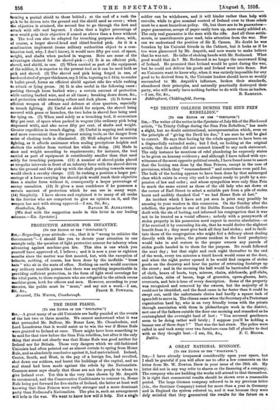THE IRISH FIASCO.
[TO THE EDITOR OP TILE " SPECTATOR."] ilba, —A great many of us old Unionists are badly puzzled at the events of the last two or three months. We cannot understand what it was that persuaded Mr. Balfour, Mr. Boner Law, Mr. Chamberlain, and Lord Lansdowne that it would assist us to win the war if Home Rule were granted to Ireland at once. There might have been something to be said for that view before the Sinn Fein rebellion, but after it the only thing that stood out clearly was that Home Rule was good neither for Ireland nor for Britain. Those very dangers which we old-fashioned Unionists had often pointed out as almost certain to spring from Home Rule, and as absolutely conclusive against it, had materialized. Ireland, Centre, South, and West, in the pay of a foreign foe, had revolted, shot down our soldiers, and burnt the buildings of the capital, and no teal stand had been made against the rebels by the Nationalists. Common-sense says clearly that those are not the people to whom to give Ireland over. Yet this is the very time chosen by Mr. Asquith to recommend, and the Conservative Coalitionists to consent to, Home Rule being put forward for five-sixths of Ireland, the latter at least well knowing that Shin Fciners were really stronger and a more dominant party than Redmond's Nationalists. The plea is, such an arrangement will help in the war. We want to know how will it help. Not a single
soldier can be withdrawn, and it will hinder rather than help with recruits, while to give nominal control of Ireland over to these rebels must be a most hazardous policy. Oh, but there are to be guarantees— paper guarantees, scraps of paper easily torn up, more easily nibbled at. The only real guarantee is the man with the rifle. And all these settle- ments, or unsettlements gone mad, take attention from the war. Nor can we understand the position of Sir E. Carson. No doubt he was forsaken by his Unionist friends in the Cabinet, but it looks as if he too were clamoured by Mr. Asquith, and now wants to make believe that he was not. He talks of shaking hands with Mr. Redmond. What good would that do ? Mr. Redmond is no longer the uncrowned King of Ireland. He promised that Ireland would be quiet during the war, but he could not deliver his goods and Ireland went into flame. But we Unionists want to know why, when it was entirely impossible for any good to be derived from it, the Unionist leaders should have so weakly succumbed to Mr. Asquith's influence, broken their standards, abandoned their principles, and naturally practically destroyed their party, who will mostly have nothing further to do with them as leaders.
—I am, Sir, &c., R. RAIIHDEN. Siddinghurst, Chidding fold, Surrey.






























 Previous page
Previous page